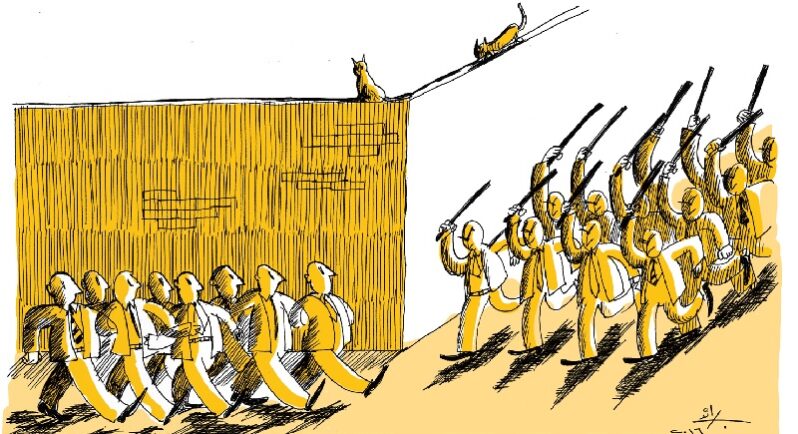Crime Prevention in Jordan: Consecrating Jalwa

The Jordanian government has recently decided to make an amendment to the Crime Prevention Law. The aim of the draft law is to limit and regulate the tribal jalwa (forced relocation) and reduce its disadvantages. Jalwa is applied when a certain clan is forced to relocate immediately if one of its members commits murder, or what is seen as an encroachment upon honor (such as rape) so that lives and properties of the aggressor’s clan are saved from any revenge assault. The draft law raises a number of observations, namely:
First: It has marginalized human rights demands regarding the cons of the Crime Prevention Law No. (7) for the year (1954). This law was one of Jordan’s most criticized by the international community and human rights organizations, due to the violations resulting from its application. It gives the administrative governor discretionary powers of administrative detention. Some pointed out that the law’s provisions are unconstitutional, and violate international conventions on human rights. The most prominent violations that were reported as a result of this law include: the misuse of administrative detention that is not in line with the correct litigation procedures provided for in Jordanian law and international standards; ill-treatment; torture; difficulty challenging the legality of the detention; absence of a periodic review by the court to look into administrative detention decisions; illegality of some litigation decisions by administrative governors; long duration of administrative detention without monitoring; and, imposition of “protective custody” on women subject to violence.[1] Despite the seriousness of these criticisms, the legislature decided to overlook them and limit the amendment to the conditions of jalwa.
Second: The proposed amendment practically aims to legally sanction the jalwa under the guise of reducing some of its repercussions. Under the amendment, jalwa would include only the offender, his sons, and his father, and for two years subject to renewal; under its current application, hundreds of members of the aggressor’s clan leave for a period that could reach up to ten years. Also for the first time ever, the draft law regulates the tribal custom known as “face cutting” [guarantor’s failure to fulfill his promise to the obligee under the truce agreement is considered a serious insult in tribal customs; deemed as a disrespect to the shaykh or notable who acted as a guarantor to the agreement]. The amendment imposes an amount of no less than JD50,000 [around US$70,000] on the violator, to be paid to kafil al-dafa [a guarantor of protection who serves to prevent aggression between the involved parties] or kafil al-wafa [a guarantor who is willing to guarantee the fulfillment of the financial obligation by the offending party under the sulha or the reconciliation agreement]. Normally, the shaykh of the clan or a dignitary well known for his morality, commitment and integrity, signs an agreement with the family of the victim in which the latter vows to not seek any revenge assault on any member of the aggressor’s clan. If one of the members of the clan of the victim violates this agreement by assaulting, in any way, a member of the aggressor’s clan, this violation is called “face cutting”. The fine for “face cutting”, which rarely happens, is often set by the tribe at around 1 million Jordanian dinars. However, that amount is usually waived and a process called “bleaching” is performed by placing white pieces of cloth, to indicate that the face of the person who has been “cut” or insulted is “white” again or honored.
Third: The amendment is intended to enhance and expand the powers of the administrative governor, rather than limit them. It entrusts the respective administrative governor with the task of supervising the implementation of procedures related to tribal issues, in addition to all the wide-range powers included in the Crime Prevention Law. The official statement by the concerned authorities, which was circulated by various media outlets, convinced many citizens of the need to keep this law, and even to grant new powers to the administrative governor. The media circulated statements like: “We are well aware of the danger posed by dangerous outlaws with criminal records, razor blade attackers, and criminals who coerce citizens to pay money, staying at large on the streets”; “We have to be realistic and not take our country to the unknown”; “…a preventive and sovereign law that safeguards the security, stability, and the lives of citizens”; “We know that the person is dangerous, but we cannot place them in confinement. We detain them administratively for as long as we deem necessary.”
In order to justify administrative detention cases ordered by administrative governors under this law, the National Center for Human Rights issued a report on administrative detention, listing a number of excuses which actually amount to confessions that very serious practices had taken place, requiring immediate abolition of the Crime Prevention Law.[2] One of these justifications, for example, is that acquitting some repeat offenders poses a risk to the community. In many cases, the judge rules acquittal or unaccountability for lack of and insufficiency of evidence, whereas the administrative governor is convinced that the concerned person actually committed the offense. The governor is also convinced that he is more aware of the problems the community suffers from and judges the person by referring to their criminal record. Such an agreement or justification violates a myriad of constitutional and legal principles. What’s the use of the judiciary and its independence, the rule of law, and the presumption of innocence if such justification is considered?
Some would claim that penalties ruled by the courts do not deter these dangerous outlaws with criminal records who serve time in prison then get released after a period of time to commit the same offense. According to this justification, there are one of the following problems: either the judge did not hand down a deterrent punishment; there is a flaw in the penalty stipulated by the law; or there is a problem in the state’s policy on reform and rehabilitation.
Another justification is that the powers of the administrative governor play an important role in resolving honor-related issues. The governor orders the detention of some girls and women in order to save their lives when the girl or woman is absent from her home or when she’s done her time for an adultery offense or any other honor-related offenses. This has been the subject of discussion and criticism by the committees and the special rapporteurs who visited Jordan. The problem of this category of women will certainly not be solved by the Crime Prevention Law, but by releasing them from “preventive” custody in a manner that is respectful of their freedom of movement and personal freedom; by developing programs, in collaboration with non-governmental organizations, to ensure long-term rehabilitation; and by finding housing solutions for victims of violence. These women victims who are denied support by their families and/or who get threats.[3]
All the previous scenarios signify a serious problem. One thing for sure is that these problems would not be addressed through the Crime Prevention Law.
There is no doubt that this draft law will enhance the social status of the administrative governor and facilitate his tasks. However, many civil society organizations are monitoring the violations arising from the Crime Prevention Law. Moreover, some of them are willing to provide free legal aid for the affected. If the situation continues as it is now, it seems resorting to the judiciary in an intense manner is the only solution to repeal this law. Decisions by the Administrative court on the illegality of many rulings by the administrative governor, based on this law, is an encouraging sign that such a strategy might work.
This article is an edited translation from Arabic.
__________
[1] See, for example, Human Rights Watch report “Guests of the Governor: Administrative Detention Undermines the Rule of Law”, May 2009; and the National Centre for Human Rights report “Administrative Detention: Judicial Powers in Executive Hands”, 2009.
[2] See: The National Center for Human Rights report “Administrative Detention: Judicial Powers in Executive Hands”, pages 18-19.
[3] See: The report of the special rapporteur on violence against women, its causes and consequences: mission to Jordan, A/HRC/20/16/Add.1, May 14, 2011, para 88.



